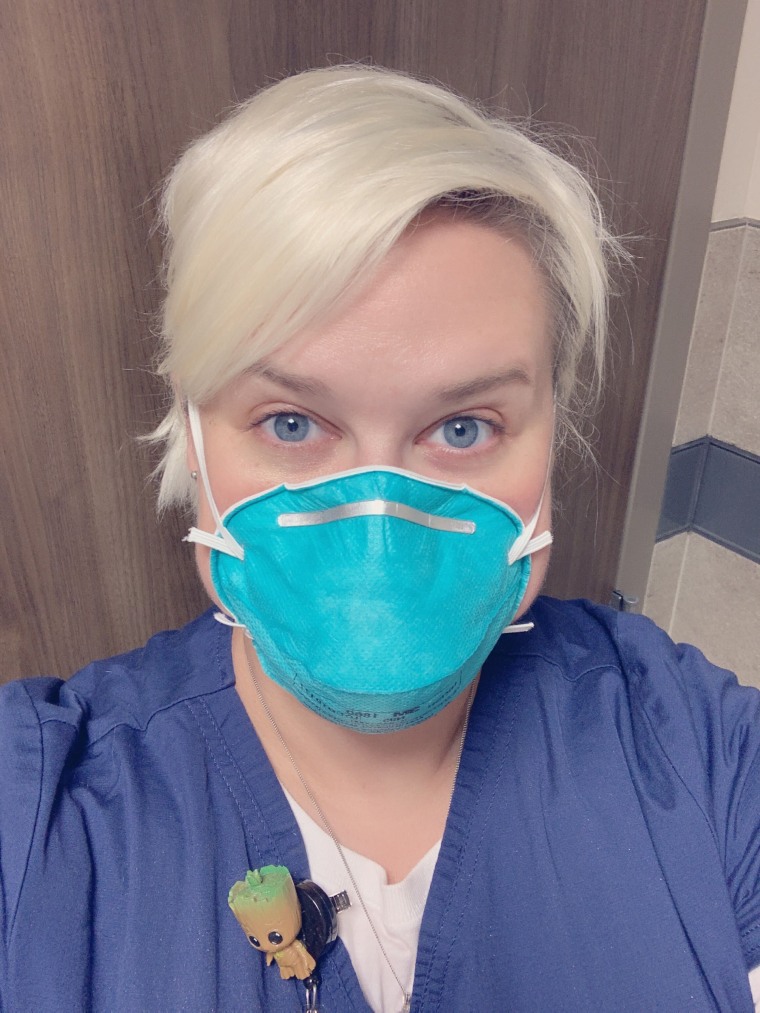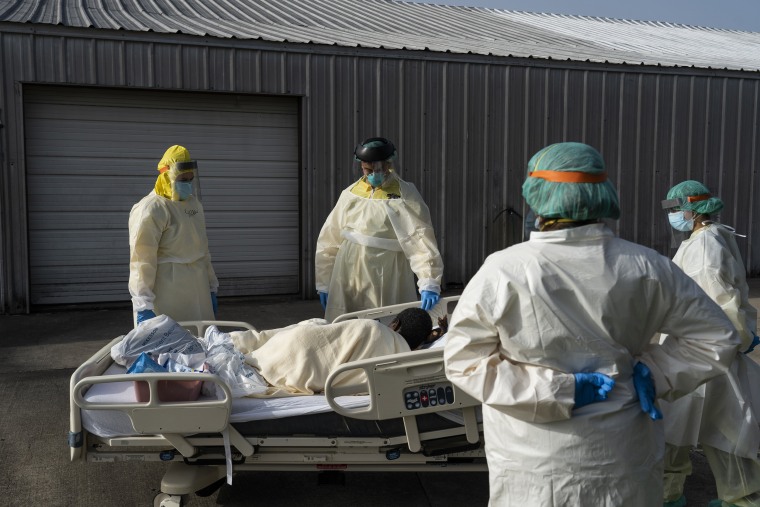When Dr. Ray Baule, a neurosurgeon, sees fellow residents of Rocky Mount, North Carolina, not wearing masks or practicing social distancing to prevent the spread of the coronavirus, he grows frustrated and worried.
That's because Baule knows exactly what it could all lead to — he saw it firsthand during the three weeks he volunteered at New York City's Elmhurst Hospital in April, when it was overwhelmed with coronavirus patients while the city was the center of the global pandemic.
"I've seen a lot of stuff in my life, but when I went into the ICU, I was shocked. It was just the most incredible thing I had ever seen," said Baule, who completed a general surgical internship at Elmhurst in 1992. "These patients were very, very sick."
Medical professionals from across the country rushed to New York City when it became the center of the pandemic in the U.S. in March and April, but now they are alarmed by what they're seeing in their own backyards as their home states report record numbers of cases.
Full coverage of the coronavirus outbreak
Almost 1 in 5 new cases of the coronavirus reported around the world one day this week came from just three U.S. states — Texas, Florida and California — an NBC News tally revealed Tuesday. The 27,574 cases recorded in those states Monday accounted for 18.9 percent of the global total and represented more than a third of the 61,751 new cases reported in the U.S.
Baule remembers well the chaos of those days at Elmhurst, when medical staffers were doing anything and everything just to keep up. Pediatricians were transporting patients, plastic surgeons were doing ventilator inventory, and he was working in the intensive care unit managing critical care patients, he said.
Now, back home in Rocky Mount, a town of about 55,000 less than 60 miles northeast of Raleigh, it seems like a completely different world, even as cases peak in the state.
"Recently I go into the store and I feel I'm the only one there wearing a mask. Even the people working there aren't wearing masks, which just blows my mind," said Baule, who said he wears a mask whenever he leaves the house. "People just don't realize. You don't realize it until you see how bad it is."
Download the NBC News app for full coverage and alerts about the coronavirus outbreak
Ivette Palomeque, a nurse in Houston, also volunteered at Elmhurst Hospital during the peak in New York.
"It was definitely overwhelming, nothing like any health care provider has seen in their lifetime," she said. "I've seen death constantly, I've seen death frequently, but to this magnitude? Never."
Palomeque arrived March 27 and didn't return home until June 29. She is back to treating patients at Memorial Hermann at Texas Medical Center, where she has worked for seven years.
"Let's say New York is full-blown chaos. This is controlled chaos," Palomeque said of what she's seeing in Houston. In Texas, the two-week death total was up by 99 percent over the previous two weeks.
"The patients are presenting the same in ... that they're getting very sick, requiring enormous amounts of oxygen and ventilation and things that clearly only an ICU would manage," she said. "So that's the dangerous part of this. If enough people get sick, it can definitely create a situation like a bed crunch."
She said that while the number of coronavirus patients isn't what she saw in New York, "that doesn't mean that it may not get there."
Palomeque said of Texans who weren't practicing social distancing or wearing masks: "I really wish they would've had a chance to see what I saw and experience what I experienced trying to take care of these people.
"For some of the general public, this will never be real unless they witness it with their own eyes or it hits them close to home, unfortunately," she said. "It's really disheartening to see so many people just not wearing a mask, not even caring, and it's just, like, I don't understand."
Her message: "Please wear your mask. People are dying. This is real."
Counties in Texas and Arizona have requested refrigerated trucks to use as makeshift morgues as the numbers of deaths have continued to rise, replicating disturbing images seen in New York City during its coronavirus peak.
Phoenix Mayor Kate Gallego told MSNBC last week that Maricopa County, Arizona, announced that it was going to be getting refrigerated trucks because the Abrazo Health system had run out of morgue space.
"It is very scary out here," she said.
In response to the comment, Melissa DeRosa, secretary to New York Gov. Andrew Cuomo, asked on Twitter: "How could the rest of America have watched what happened in New York in March and let this happen in July?"
Jess Esperti, a nurse from Arizona who also treated patients at Elmhurst Hospital in April, said the hardest part was that so many patients were dying that there wasn't always enough time to inform family members or let them grieve.
"New York was such a whirlwind, because we didn't have time to do that with our patients," said Esperti, who works for several Phoenix-area hospitals. "People would call and ask for an update and find out that their loved one had passed.

"That's not any way that I would want anyone to go, not being able to talk to their family," she said.
Esperti said that while cases are rising in Arizona, she still has time to do what she wasn't always able to do in New York.
"Maybe it's going to get worse, but we at least have some time to be able to do those things for people that we weren't able to do at the very beginning," she said.
She said she recently treated a 74-year-old woman who wasn't going to be able to come off a BiPap machine, which helps push air into a patient's lungs.
"As soon as we got her in touch with all of her kids from around the country, all at once she felt better, like, 'Yeah, I can go now,'" Esperti said. "We got her family in a group video chat, and all of her kids watched as we took the BiPap off and she passed away."
Esperti said it was a sharp contrast from not always having time to give every family such intimate final moments during New York's coronavirus peak.
"It's something that I will forever, you know, try to be better at," she said. "I know what 'I don't have time' means because of New York."
Esperti said she was humbled by her volunteering experience and the teamwork of the medical staff in pushing through the crisis.
"You know, all of us nurses that were in New York, you can't really explain this to anybody," she said. "I mean, the only people that are going to understand is the people that actually worked there, because it's just impossible to explain fully what it was like."




